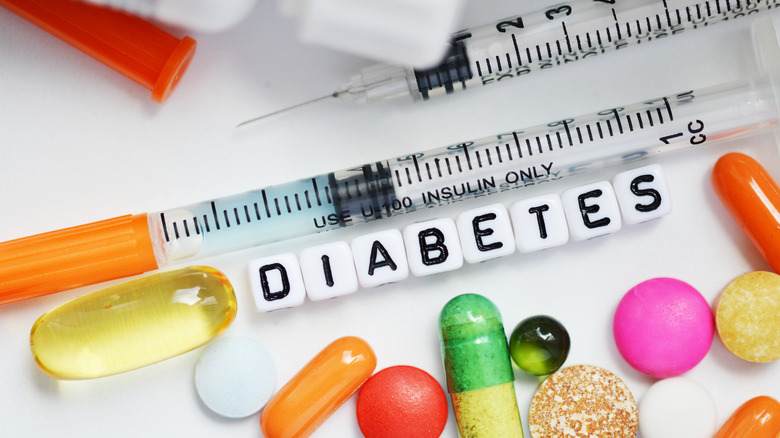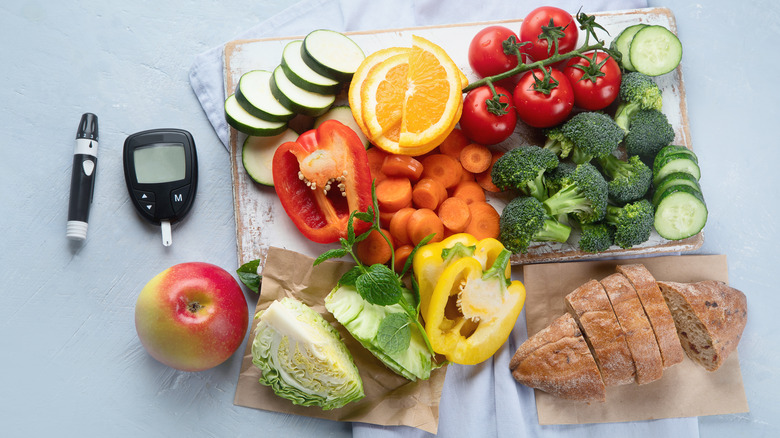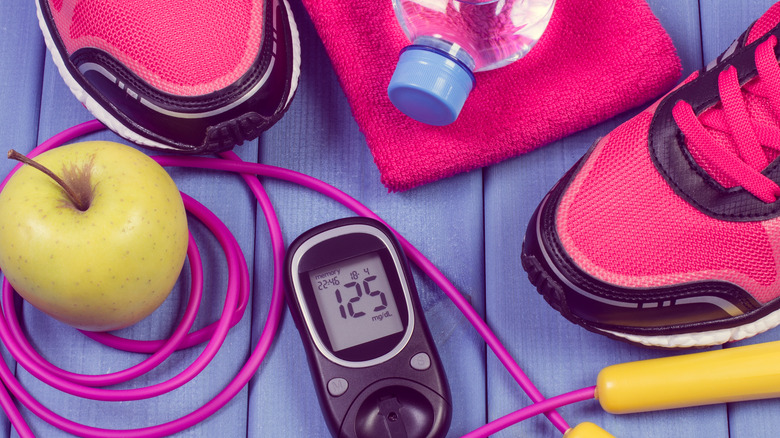Myths About Diabetes You Can Stop Believing
Diabetes is a disease that affects the way your body manages sugar. Thus, it is characterized by frequently having high blood sugar levels (per the Mayo Clinic). There are different types of diabetes. Both type 1 and type 2 diabetes are chronic conditions that will require ongoing medical attention, whereas someone can recover from both gestational diabetes (diabetes that comes on during pregnancy) and prediabetes (elevated blood sugar levels that haven't climbed high enough to count as diabetes). Nevertheless, they are all grouped under the term "diabetes mellitus," because despite having independent causes, the result is pretty much the same.
The number of people with diabetes has been steadily rising over the past couple of decades, and the disease affects well over 422 million people worldwide, according to the World Health Organization (WHO). Having high blood sugar levels leads to the most common symptoms of diabetes, which include weight loss despite feeling constant hunger, feeling thirsty, tired, or weak, frequent need to urinate, mood swings, and blurred vision (via Mayo Clinic). However, depending on the type of diabetes, you may or may not show symptoms at all.
Sadly, chronically high blood sugar levels can also damage your nerves, heart, kidneys, and eyes in the long run, leading to serious health complications. The good news is that diabetes can be managed with proper treatment and lifestyle changes, which can help prevent or delay said complications, the WHO explains. Still, dealing with a diabetes diagnosis can be pretty confusing with all the information available online. Knowing what's true about diabetes and what's nothing more than an outdated myth can be very helpful when it comes to managing the disease.
People with diabetes can't eat sweets
It is true that people with diabetes should be more mindful of their sugar intake. In fact, according to a 2019 article published in Diabetes Care, people with diabetes are encouraged to focus on consuming more complex carbs the majority of the time and minimize their intake of refined carbs and added sugars. This is because of the effect these foods have on your blood sugar levels and, thus, your blood sugar control.
Per a 2018 review published in the journal Nutrients, carb-containing foods can have widely different effects on your blood sugar depending on their glycemic index (GI). The GI of a food tells you how it may affect your blood sugar levels. For instance, low-GI foods such as whole grains (those with a GI under 55) are the ones you digest and absorb slowly, leading to a steady and extended rise and fall in your blood sugar. In contrast, high-GI foods such as sweets and sugar-sweetened beverages (the ones with a GI over 70) are known for causing your blood sugar levels to spike and then plummet. Medium-GI foods have a GI between 56 and 69, and they have an intermediate effect.
While evidence suggests that people with diabetes would benefit from following a low-GI diet (per a meta-analysis published in The American Journal of Clinical Nutrition), this doesn't mean that you must completely avoid sweets if you have diabetes. The truth is that people with diabetes can have sweets in moderation as part of a balanced diet — the key is portion control (via Healthline).
Diabetes is a contagious disease
The idea that diabetes is contagious is a common misconception that should be put to rest once and for all. According to a 2016 study published in Frontiers in Public Health, the WHO states that chronic diseases are not passed from one person to another. Therefore, the reality behind the myth is that people with diabetes can't pass their condition on to other people through casual contact like hugs or handshakes or via bodily fluids like blood or saliva. Instead, diabetes is a result of a series of genetic and environmental factors, according to the Centers for Disease Control and Prevention (CDC).
The CDC explains that people most likely get type 1 diabetes due to an autoimmune reaction — meaning that the body mistakenly attacks itself, keeping the pancreas from producing the insulin their body needs to control blood sugar. In contrast, people develop type 2 diabetes when their tissues stop responding to insulin, meaning that insulin becomes inefficient at doing its job.
Diabetes only affects people who are overweight or obese
There surely is a lot of stigma behind diabetes and body weight, yet the belief that only people who are overweight or obese develop diabetes is just another myth. Generally speaking, your risk of developing type 2 diabetes goes up as your body mass index (BMI) increases (per the CDC). Nevertheless, a small 2013 study published in the Indian Journal of Endocrinology and Metabolism states that lean people can also be diagnosed with type 2 diabetes, though it's less likely. Per the study, the risk was higher in women than in men.
According to the CDC, other potential factors that increase the likelihood of developing type 2 diabetes include having a direct relative such as a parent or sibling with type 2 diabetes, leading a sedentary lifestyle or exercising less than three times per week, having had gestational diabetes or birthed a baby weighing over nine pounds, and having non-alcoholic fatty liver disease. Furthermore, your ethnicity may also play an important role — African American, Hispanic, American Indian, Alaska Native, and some Asian American people also have a higher risk. As for type 1 diabetes, the CDC explains that diet and lifestyle factors don't influence its onset. It can happen to anyone regardless of their weight or age.
Type 2 diabetes is mild compared to type 1 diabetes
The idea that type 2 diabetes is mild compared to type 1 diabetes comes from the differences in their management. In people with type 1 diabetes, the pancreas doesn't produce insulin. Therefore, they must get it from insulin injections or insulin pumps — which is why this type was once known as insulin-dependent diabetes (per the CDC). In contrast, people with type 2 diabetes can often manage the condition solely by making lifestyle changes such as following a healthy diet and doing more physical activity, though they may sometimes be prescribed medication as well (via the CDC).
Nevertheless, over time, type 2 diabetes can progress toward a stage in which the pancreas doesn't produce insulin anymore, meaning that people with type 2 diabetes can also become insulin-dependent (per Healthline). In addition, regardless of the type of treatment needed, type 2 diabetes can also lead to severe and even life-threatening complications, such as heart disease; nerve, kidney, and eye damage; skin conditions; and depression (per the Mayo Clinic).
All people with diabetes must take insulin
Because diabetes is directly associated with your body's ability to produce or respond to the hormone insulin, you might think that all people with diabetes must take insulin shots. However, this is nothing but a myth, because not all people with diabetes are insulin-dependent. According to the American Diabetes Association (ADA), only those diagnosed with type 1 diabetes are prescribed insulin from the get-go.
Per the CDC, people with type 1 diabetes represent only about 5–10% of the people who have the condition. In contrast, up to 95% of people with diabetes are diagnosed with type 2. This means that the vast majority don't need to take insulin right off the bat. Instead, they could start by managing their blood sugar levels through a series of lifestyle changes, such as monitoring their refined carb intake, managing stress, avoiding smoking, maintaining a healthy weight, and exercising regularly (via Healthline).
Those who take insulin don't need to make lifestyle changes
Since keeping a healthy weight is an important element of managing the disease, making lifestyle changes is key for living with diabetes regardless of whether or not you're taking insulin or oral medications (per the Mayo Clinic). In fact, according to a 2019 article published in Diabetes Care, lifestyle management is crucial, and you should even evaluate your lifestyle management skills and choices at the moment of diagnosis, annually, whenever a complication arises, and when your doctor modifies your treatment plan.
Lifestyle changes such as nutrition therapy, physical activity, avoiding smoking, and stress management have the potential to improve diabetes outcomes, including lower glycated hemoglobin or HbA1c (a measure of your blood sugar levels over the last three months), improved quality of life, weight reduction, and a reduced risk of diabetes-related complications. Furthermore, they can also help reduce healthcare costs and hospital visits. According to the Mayo Clinic, some simple ways to get started include adding more fruits, vegetables, and whole grains to your diet, cutting back on unhealthy fats and refined carbs, and aiming for at least 30 minutes of your favorite physical activity per day.
People with diabetes need to eat special foods
It is a myth that people with diabetes should eat special foods like sugar-free snacks or candy. Yet, seeing that people with diabetes should reduce their sugar intake, and with such a wide range of sugar-free products available in stores, you may wonder whether they would make a good dietary choice. As registered dietitian Anna Taylor explains via the Cleveland Clinic, while sugar-free products have some benefits, like providing fewer carbs, sugar, and calories, some sugar substitutes or non-caloric sweeteners still contain a bit of carbs and could still raise blood sugar levels if consumed in excess. Additionally, many sugar-free products use sugar alcohols like xylitol, mannitol, and sorbitol for sweetness, which could also cause abdominal discomfort such as bloating, gas, and diarrhea if consumed in large amounts. Furthermore, per a 2019 study published in the journal Clinical Chemistry, non-caloric sweeteners have been associated with an increased food intake and preference for sweets, which could lead to weight gain in the long run.
The truth is that what matters most when managing diabetes through your diet is that you find a balanced way to eat. Per a 2019 article published in Diabetes Care, healthy dietary patterns such as the Mediterranean, plant-based, and Dietary Approaches to Stop Hypertension (DASH) diets have shown positive results when it comes to blood sugar control. What these diets have in common is their high intake of wholesome foods like fruits, vegetables, whole grains, legumes, nuts, and seeds, and their low intake of red meat and processed foods (via Healthline).
Carbs must be avoided if you have diabetes
The notion that people with diabetes should avoid carbs is another common misconception about the disease. Carbs are an essential nutrient that fuel both your brain and body, and the right kind can be a part of a healthy diet and help you keep your blood sugar in check (per Livestrong). There are two main types of carbs, simple and complex, and they have very different effects on your blood sugar levels. Simple carbs are the ones that your body can break down more easily. In contrast, complex carbs take longer to digest and therefore provide a steady and prolonged sugar release. This means that instead of spiking your blood sugar, complex carbs help you avoid blood sugar levels that are either too high or too low, which is precisely what people with diabetes should aim for, according to the CDC.
According to the CDC, there are different strategies that help people with diabetes choose the right kind and amount of carbs for their meals, including eating approximately the same amount of carbs at each meal, counting carbs, or following the plate method. While some may be more technical than others, they all involve filling the majority of your plate with non-starchy vegetables and then completing it with a couple of servings of complex carbs and lean proteins. Lastly, when it comes to packaged foods, the CDC recommends reading food labels to make healthier choices. For example, try to avoid products high in added sugars and choose those with more fiber instead.
People with diabetes go blind
Yes, diabetes can affect your eyes, but that doesn't mean that people with diabetes go blind. The myth that diabetes causes blindness is most likely due to the fact that those with the condition have a higher risk of developing diabetes retinopathy, the leading cause of blindness in the U.S. and one of the most common causes of vision loss in people with diabetes (per WebMD). Diabetes retinopathy occurs when your blood sugar levels remain high for too long, which leads to sugar accumulating and damaging blood vessels in your eye. In time, the damage to your blood vessels may lead to blindness or other eye conditions such as glaucoma or cataracts.
However, according to the CDC, you can prevent diabetes-related vision loss if you manage your blood sugar and get annual eye exams. People with diabetes should also quit smoking and keep their blood pressure and cholesterol levels in check, as these are additional risk factors for diabetic retinopathy. Lastly, the CDC recommends visiting your eye doctor if you experience any sudden changes in your vision such as flashes, blurriness, spots, blind spots, distortion, or if you struggle to read or see fine details.
Those with diabetes will lose their legs
The CDC explains that people with diabetes should be more mindful of their foot health because they have a higher risk of developing nerve damage. Nerve damage can happen if you have high blood sugar levels for a long time — this can harm your nerves, especially the ones in your feet and legs. Per a 2019 study published in the journal Current Diabetes Reports, this complication is called diabetic peripheral neuropathy, and it could lead to the loss of sensation or pain in your lower extremities, meaning that you may overlook injuries in your toes, feet, or legs. If an untreated wound then become infected, your limb may require amputation.
In fact, according to the study, about 83% of all major amputations in the U.S. are due to a diabetes-related complication, and around 25% of people with diabetes develop foot ulcers, which can get infected and progress to limb amputation in severe cases. Nevertheless, getting a diabetes diagnosis doesn't automatically mean losing your legs. Per the CDC, keeping your blood sugar levels within your target range is the best way to prevent nerve damage. Additionally, checking and washing your feet daily, avoiding going barefoot, and trimming your toenails in a straight line so as to avoid ingrowth are some tips that could help you either avoid foot problems altogether or catch and treat them early on.
People with diabetes are more likely to get sick
People with diabetes are just as likely to get sick as any other people, yet some still believe they are more prone to illness, which could be due to two potential reasons. On the one hand, doctors tend to advise people with diabetes to take preventive actions to avoid getting sick due to the effect of sickness on blood sugar levels. According to the CDC, when your body fights off diseases, it releases hormones that raise blood sugar levels. Thus, when you're sick, blood sugar may remain higher than usual despite your habitual efforts to keep it within your target range.
On the other hand, diabetes does increase the risk of flu complications such as pneumonia, bronchitis, and sinus and ear infections, even if your diabetes is well-managed (via the CDC). For that reason, people with diabetes should get the flu vaccine each year, which is considered the best protection against common flu viruses.
Women who get gestational diabetes become diabetic for life
Gestational diabetes is a type of diabetes that women who don't have the disease can develop during pregnancy. In fact, as many as 10% of pregnancies in the U.S are affected by the condition (per WebMD). According to the CDC, gestational diabetes is caused due to the effect of pregnancy weight gain on your cells' ability to respond to insulin — a condition called insulin resistance — which leads to higher blood sugar levels. While it's normal for your blood sugar levels to rise during pregnancy (especially during the third trimester), some women's pancreases aren't able to keep up with the increased demand.
Per a 2021 study published in the journal Biomedicine and Pharmacotherapy, gestational diabetes increases the risk of experiencing other pregnancy-related complications such as pre-eclampsia (high blood pressure during pregnancy) and difficult deliveries due to an increased baby size. It also increases the chance of developing type 2 diabetes and heart disease for both the mom and baby in the long run. Luckily, in most cases gestational diabetes goes away once you give birth and your blood sugar returns to its pre-pregnancy levels. In addition, per WebMD, you can prevent long-term complications by following a healthy diet, exercising, and keeping a healthy weight before, during, and after your pregnancy.
Diabetics can't play sports
The myth that suggests that people with diabetes can't play sports or engage in physical activities is not only potentially harmful, but has been long debunked by science. In fact, according to a 2022 study published in The International Journal of Environmental Research and Public Health, physical activity is an essential intervention tool for diabetes management that can also reduce the risk of long-term diabetes complications such as heart disease.
The ADA explains that when you exercise, your cells become more sensitive to insulin, meaning that they allow it to be more efficient at keeping your blood sugar levels within the desired range. Therefore, per a 2019 article published in Diabetes Care, people with type 1 and 2 diabetes should aim for 150 minutes of moderate to vigorous physical activity per week. The article also recommends performing both aerobic and resistance training to manage your blood sugar (that is, doing both cardio and weight lifting). If you don't yet have an established exercise routine, the ADA recommends that you start by incorporating light walks first.
People with diabetes should not drive
People with well-managed diabetes can lead perfectly regular lives (per Diabetes.co.uk). Still, some believe that getting a diabetes diagnosis is a disability sentence that will keep them from doing their daily activities, including driving. Nevertheless, this is nothing but another unfounded myth, likely derived from the risk of low blood sugar levels while sitting behind the wheel.
Hypoglycemia occurs when your blood sugar drops below 70mg/dL, which could happen due to mistakes with your insulin dose or carb intake, hot weather, high altitude, alcohol intake, and even the macronutrient composition of your meal (via the CDC). It can lead to confusion, dizziness, weakness, and even fainting in severe cases, which as you can imagine could be fatal if it were to occur while you are driving. However, there are ways to prevent hypoglycemia, like eating regularly and checking your blood sugar levels frequently. Also, if you do experience low blood sugar, there are ways to treat it quickly so that it doesn't impact your driving or your ability to make wise decisions behind the wheel. In a pinch, try consuming 15 grams of regular soda, fruit juice, honey, sugar, syrups, hard candies, or glucose tablets or gels and checking your blood sugar after 15 minutes to check if it has come up to your target range (via Healthline).















